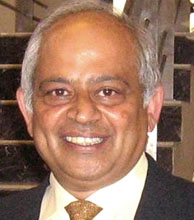CEO Insights: Preferred Brands grows on global stage

Business Journal contributor Brad Scheller recently sat down for a conversation with Ashok Vasudevan, CEO and founder of Preferred Brands International L.L.C., about leading and growing an international food company.
The company, which is based in Stamford and does business as Tasty Bite Preferred Brands International, markets 39 entrees, sauces, rice varieties and meal inspirations ”” all of which are sold in major grocery chains across the U.S. and worldwide.
The following are excerpts of their conversation.
Scheller: How did your company get its start?
Vasudevan: “The idea actually began when I was an executive at Pepsi. It was a project born out of necessity as one of several ways for Pepsi to discharge its export obligations for its right to doing business in India. Later, when India liberalized its regulations and lifted these conditions, there was no reason for Pepsi to engage in these crazy activities which weren”™t core to their business and an opportunity door opened. We saw this opportunity at the center of three mega trends: health and natural foods becoming more popular, convenience foods becoming more important and the desire for choice and variety in foods expanding as our international palates evolve.”
Talk about the challenges of running a global company.
“Culture is a big challenge. We operate in three countries ”“ Australia, India and the U.S. ”” and the cultures in the three are quite different. The U.S. culture is to be direct. The Aussies tend to a small English penchant for elocution and the Indians have a certain way of saying no. It”™s almost impolite to say to no, but it”™s implied. Word choice and meaning of words are a big challenge. Take for example a simple saying like ”˜I don”™t care.”™ In the U.S. it means you have a choice, either way is fine, I don”™t care. From an Indian perspective, ”˜I don”™t care”™ is an obnoxious thing to say. It literally means I don”™t care ”“ about you. It”™s rude. So you can”™t say that I don”™t care. You say I”™m indifferent to the outcome or the choice you make. You decide.”
What are the most important leadership lessons you”™ve learned over the years?
“Eyes on, hands off when you can. I think of leadership and followership as almost the same thing which is a bit non-intuitive at first. I think of good leaders as first being good followers. If you hire people who are smarter than yourself this is a very important thing. I think I”™ve been immensely successful in one thing ”“ everybody on the senior leadership team is way smarter than I am. I have no hesitation in saying that ”” whether it”™s their quality of education, experience or their expertise. So if you”™re successful in doing that as a ”˜leader,”™ your first job is to be a good follower. And that you do if you keep your eyes on and your hands off.”
How do you think about failure in your organization?
“We talk about empowerment. We don”™t say empowerment is the right to make decisions. We say that empowerment is the right for you to make the wrong decision. Empowerment is your right to make a mistake. Then you are truly empowered. Anybody can be in power as long as they continually make good decisions. The point is you don”™t. You make mistakes. And if you make mistakes and you”™re bitten you hesitate the next time. So we say empowerment is your ability to make a mistake and not get called on it. We learn from it by questioning the assumptions behind that decision.”
Let”™s talk about hiring. How do you do it?
“We think of it as a triangle ”” education, experience and expertise. We have a job description for every job. The major aspects of the job, the objectives for each job and the tasks required for each job. Whether we brief a recruiter or internally, it is very clear what criteria we are looking for.
“When we begin looking at the people, we look at each of those three points on the triangle. The values we place on education here are disproportionate to the others. There is a bias towards high quality education. Second is experience: We like and value large corporate experience and entrepreneurial experience. The third area is expertise. We need domain expertise. Can you hold a training class on that subject? Are you an expert?”
How do you motivate your employees?
“We are big into awards. Anybody here can sponsor an award. It can be within a function, it can be cross-functional or it can be cross-company. And anybody can nominate anybody for an award. Our theory is that people feel good not only when they are awarded, people feel as good when they are the ”˜awarder.”™ You want to transform incentives from receiving the award to giving the award. This gives you a certain sense of well being. We encourage people to nominate at any point in time.”
Brad Scheller, founder of Pivot Point Consulting Group in Wilton, is a CEO coach, management consultant, and facilitator of local Renaissance CEO Advisory Boards and can be reached at bscheller@pivotpointgroup.net.